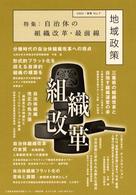- ホーム
- > 洋書
- > 英文書
- > Psychology
Full Description
Why did people mobilize for the Arab Spring? While existing research has focused on the roles of authoritarian regimes, oppositional structures, and social grievances in the movement, these explanations fail to address differences in the behavior of individuals, overlooking the fact that even when millions mobilized for the Arab Spring, the majority of the population stayed at home. To investigate this puzzle, this book traces the reasoning processes by which individuals decided to join the uprisings, or to refrain from doing so. Drawing from original ethnographic interviews with protestors and non-protestors in Egypt and Morocco, Dornschneider utilizes qualitative methods and computational modeling to identify the main components of reasoning processes: beliefs, inferences (directed connections between beliefs), and decisions.
Bridging the psychology literature on reasoning and the political science literature on protest, this book systematically traces how decisions about participating in the Arab Spring were made. It shows that decisions to join the uprisings were "hot," meaning they were based on positive emotions, while decisions to stay at home were "cool," meaning they were based on safety considerations. Hot Contention, Cool Abstention adds to the extensive literature on political uprisings, offering insights on how and why movements start, stall, and evolve.
Contents
Chapter 1: An Extraordinary Experience
Chapter 2: Similar States, Opposite Outcomes: Egypt and Morocco
Chapter 3: Identifying Beliefs and Inferences
Chapter 4: Tracing Reasoning Processes
Chapter 5: Hot Contention, Cool Abstention
Chapter 6: Conclusions
Bibliography
Appendices
Appendix 1: The sample
Appendix 2: Beliefs identified by the qualitative analysis
Appendix 3: z-scores
Appendix 4: Minimum sets of beliefs








